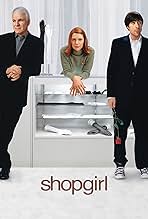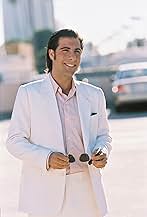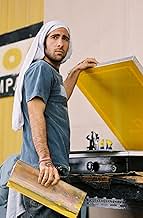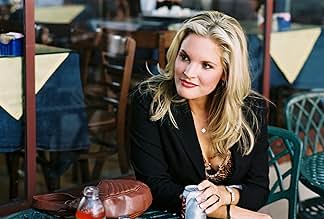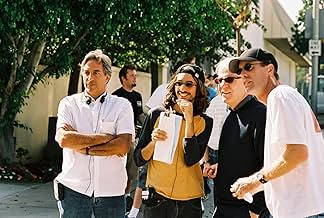CALIFICACIÓN DE IMDb
6.3/10
25 k
TU CALIFICACIÓN
Muestra un complejo triángulo amoroso entre una vendedora aburrida, un rico hombre de negocios y un joven sin rumbo.Muestra un complejo triángulo amoroso entre una vendedora aburrida, un rico hombre de negocios y un joven sin rumbo.Muestra un complejo triángulo amoroso entre una vendedora aburrida, un rico hombre de negocios y un joven sin rumbo.
- Premios
- 1 premio ganado y 7 nominaciones en total
John Fedevich
- Hot Tears Band Member
- (as Johnny Fedevich)
Opiniones destacadas
Edward Hopper was the great painter of urban loneliness. Shopgirl had two perfectly composed and lit shots that could pass for Hopper paintings -- the one where we first see Mirabelle behind the glove counter at Saks, and the one where she solves the problem of how exactly to cross the intimacy threshold with Ray for the first time. Both involve the display of exquisite merchandise to customers who have excellent taste but don't quite appreciate the full value of what's being offered.
The relationship between Ray and Mirabelle is, of course, a transaction. Ray is what used to be called a sugar daddy. He knows it, and within the limits of that role he is apparently a generous and considerate keeper. We aren't given Ray's back story, but it is not hard to guess that a symbolic logician who made a fortune in computers might have been socially challenged, to put it mildly, as a young man, and suffered a good deal of rejection from women. He can now buy what he couldn't then woo, but experience has taught him never to relinquish control and never to let himself be vulnerable. A few hundred million dollars have cleaned up his exterior nicely and given him power over his surroundings, but the inner nerd is still there.
Mirabelle certainly appreciates the value of what Ray can do for her. Consider the shot in Vermont where she gazes at her dried out, prematurely worn mother and decides she'll meet Ray in New York after all. But Mirabelle refuses to admit to herself that she is only being kept. We are meant to think the better of her for her self deception. The sluttish, annoying and frankly mercenary but cheerfully self aware Lisa is there to draw an unfavorable contrast with Mirabelle. Paradoxically, it is Mirabelle's self-deceived integrity, and her refusal to use the crude manipulations Lisa suggests, that make her a more exquisite ornament for Ray -- gourmet arm candy for a man with the finest taste. Both women are punished for self deception, but Lisa suffers only comic humiliation while Mirabelle sets herself up for real pain.
Jeremy has the makings of a Ray in him, but we are meant to believe that he has -- implausibly -- attained emotional enlightenment, if not the capacity for articulate speech or sustained rational thought. He has earned Mirabelle, we are told, because he has remade himself to be worthy of her. Love may not conquer all in this bittersweet anti-romance, but it still does better than break even.
The relationship between Ray and Mirabelle is, of course, a transaction. Ray is what used to be called a sugar daddy. He knows it, and within the limits of that role he is apparently a generous and considerate keeper. We aren't given Ray's back story, but it is not hard to guess that a symbolic logician who made a fortune in computers might have been socially challenged, to put it mildly, as a young man, and suffered a good deal of rejection from women. He can now buy what he couldn't then woo, but experience has taught him never to relinquish control and never to let himself be vulnerable. A few hundred million dollars have cleaned up his exterior nicely and given him power over his surroundings, but the inner nerd is still there.
Mirabelle certainly appreciates the value of what Ray can do for her. Consider the shot in Vermont where she gazes at her dried out, prematurely worn mother and decides she'll meet Ray in New York after all. But Mirabelle refuses to admit to herself that she is only being kept. We are meant to think the better of her for her self deception. The sluttish, annoying and frankly mercenary but cheerfully self aware Lisa is there to draw an unfavorable contrast with Mirabelle. Paradoxically, it is Mirabelle's self-deceived integrity, and her refusal to use the crude manipulations Lisa suggests, that make her a more exquisite ornament for Ray -- gourmet arm candy for a man with the finest taste. Both women are punished for self deception, but Lisa suffers only comic humiliation while Mirabelle sets herself up for real pain.
Jeremy has the makings of a Ray in him, but we are meant to believe that he has -- implausibly -- attained emotional enlightenment, if not the capacity for articulate speech or sustained rational thought. He has earned Mirabelle, we are told, because he has remade himself to be worthy of her. Love may not conquer all in this bittersweet anti-romance, but it still does better than break even.
"Shopgirl", the magnificent novella by Steve Martin, finally arrives as a movie that expands on the text, as Anand Tucker, its director, demonstrates. Steve Martin also adapted his own story, which works well with the movie version since he knows what he wants to say and how to present the story in cinematic terms.
This film is about how sometimes a man, who evidently is a successful business person, can't see what he does to a woman who, in spite of the warnings, has fallen deeply in love with him. Ray Porter, is an egotistical man, incapable of expressing his emotions unless they are in the form of material things. Ray is an empty man who can buy whoever he wants to be with, but who demands there will be no strings attached to any sort of relationship.
Mirabelle, the young gloves sales lady at Los Angeles' Saks 5th Ave., is a lonely girl who has relocated to the city from Vermont. It's hard for anyone in that environment to connect with people, especially in a place like L.A. where no one talks to one another and everyone seems to be impressed with celebrities that are to be seen everywhere. Mirabelle is destined to a life of loneliness until two men appear at about the same time, the goofy Jeremy, and Ray Porter.
Jeremy likes Mirabelle in his own crazy way. Mirabelle responds to him because he means easy companionship without complications. When Ray appears on the scene, Mirabelle has no clue about what she is getting in for. Before anything, Ray makes it clear he wants no commitment, and no attachment. It's just a convenient situation for him as he has calculated that Mirabelle is perhaps a sexual diversion, at best. He finally reveals what he really has in mind when he tells the girl his intentions for the New York apartment, something that he hasn't included her in, at all.
This bittersweet story comes alive because of Claire Danes great performance as Mirabelle. Ms. Danes is perfectly cast as Mirabelle. Steve Martin's characterization as Ray Porter, is superb in his take about this man. Mr. Martin clearly understands what this man is really like and what makes him tick. Both these actors contribute to making their characters feel real.
On the other hand, the goofy performance from Jason Schartzman is distracting from the other story. The best sequence involves the beautiful Bridgette Wilson in thinking Jeremy is the real Ray Porter.
The excellent cinematography by Peter Suschitzky gives "Shopgirl" a sophisticated look that goes perfectly with the story being told. Anand Tucker directed with elegance and a sure hand making the film a winner.
This film is about how sometimes a man, who evidently is a successful business person, can't see what he does to a woman who, in spite of the warnings, has fallen deeply in love with him. Ray Porter, is an egotistical man, incapable of expressing his emotions unless they are in the form of material things. Ray is an empty man who can buy whoever he wants to be with, but who demands there will be no strings attached to any sort of relationship.
Mirabelle, the young gloves sales lady at Los Angeles' Saks 5th Ave., is a lonely girl who has relocated to the city from Vermont. It's hard for anyone in that environment to connect with people, especially in a place like L.A. where no one talks to one another and everyone seems to be impressed with celebrities that are to be seen everywhere. Mirabelle is destined to a life of loneliness until two men appear at about the same time, the goofy Jeremy, and Ray Porter.
Jeremy likes Mirabelle in his own crazy way. Mirabelle responds to him because he means easy companionship without complications. When Ray appears on the scene, Mirabelle has no clue about what she is getting in for. Before anything, Ray makes it clear he wants no commitment, and no attachment. It's just a convenient situation for him as he has calculated that Mirabelle is perhaps a sexual diversion, at best. He finally reveals what he really has in mind when he tells the girl his intentions for the New York apartment, something that he hasn't included her in, at all.
This bittersweet story comes alive because of Claire Danes great performance as Mirabelle. Ms. Danes is perfectly cast as Mirabelle. Steve Martin's characterization as Ray Porter, is superb in his take about this man. Mr. Martin clearly understands what this man is really like and what makes him tick. Both these actors contribute to making their characters feel real.
On the other hand, the goofy performance from Jason Schartzman is distracting from the other story. The best sequence involves the beautiful Bridgette Wilson in thinking Jeremy is the real Ray Porter.
The excellent cinematography by Peter Suschitzky gives "Shopgirl" a sophisticated look that goes perfectly with the story being told. Anand Tucker directed with elegance and a sure hand making the film a winner.
Greetings again from the darkness. Gotta hand it to 60 year old Steve Martin. He cranks out the easy hits like "Father of the Bride" and "Cheaper by the Dozen" so that he can do his own pet projects like the underrated "Bowfinger" and now "Shopgirl". Based on his own novella, Martin explores the mid-life fantasy of a powerful, rich businessman who takes on a beautiful, younger, unspoiled country girl from Vermont.
While the insight into quiet desperation is always fascinating, Martin's script fails to really show any human connection between the three leads. Martin's own character, while easily the most privileged, is far and away the most distant and least interesting. The always interesting Claire Danes desperately wants to be loved and escape the ever-present cold existence of Vermont which continues to haunt her. Jason Schwartzman (fast cornering the market on quirky to the point of annoying dudes) is initially enamored with the idea of being with Claire (or anyone) but goes on the road with a rock band and finds himself ... or at least educates himself on how to fit into society.
Not sure if any of the characters have any real redeeming qualities, but they do make for moderately interesting film-making. Bridgette Wilson (Mrs. Pete Sampras) has a fluffy role as the envious make-up queen, Sam Bottoms makes a rare screen appearance as Danes say-little Dad and Francis Conroy (Beautiful Flowers, Six Feet Under) has a brief appearance as Daines Mom. Interesting side note is that Rebecca Pigeon has a small role ... she is the real life wife of the great David Mamet.
Although, the lighting is atrocious and distracting in most every scene, you do find yourself hoping that someone, ANYONE, discovers a moment of real happiness. Yes, this story could have been better presented, but it is worth watching to view first hand how people pretend to connect.
While the insight into quiet desperation is always fascinating, Martin's script fails to really show any human connection between the three leads. Martin's own character, while easily the most privileged, is far and away the most distant and least interesting. The always interesting Claire Danes desperately wants to be loved and escape the ever-present cold existence of Vermont which continues to haunt her. Jason Schwartzman (fast cornering the market on quirky to the point of annoying dudes) is initially enamored with the idea of being with Claire (or anyone) but goes on the road with a rock band and finds himself ... or at least educates himself on how to fit into society.
Not sure if any of the characters have any real redeeming qualities, but they do make for moderately interesting film-making. Bridgette Wilson (Mrs. Pete Sampras) has a fluffy role as the envious make-up queen, Sam Bottoms makes a rare screen appearance as Danes say-little Dad and Francis Conroy (Beautiful Flowers, Six Feet Under) has a brief appearance as Daines Mom. Interesting side note is that Rebecca Pigeon has a small role ... she is the real life wife of the great David Mamet.
Although, the lighting is atrocious and distracting in most every scene, you do find yourself hoping that someone, ANYONE, discovers a moment of real happiness. Yes, this story could have been better presented, but it is worth watching to view first hand how people pretend to connect.
Adapted by Steve Martin from the novella by Steve Martin and starring Steve Martin this constipated and passionless romance film it is fair to say can be blamed on this one time wild and crazy guy gone serious. The book, brief as it is runs out of steam after a promising start and this basically three character film would probably stagger around in the same lugubrious stupor were it not for the way Martin has to turn one of his characters into a zany deus ex machina in order to jolt some life into it for the film's bittersweet happy ending.
Vermont transplant Mirabelle Butterfield is an undiscovered artist working as a sales clerk at Sak's Fifth Avenue in LA. Unfulfilled and lonely (even her cat won't come out to greet her upon returning from a day's work)she meets and dates two completely different men. Jeremy is a man child that finds wonderment in neon signs and sees no problem in using plastic sandwich bags for a condom. Then there's sophisticate Ray Porter who has homes in LA and Seattle and gets around by private jet. Jeremy is quickly jettisoned once Mirabelle feels she has something more serious and tangible in her relationship with the wealthier and older Ray so he gets a job as a roadie and goes on tour with a rock band. Meanwhile Ray's feelings remain ambiguous. It eventually goes bad in the most mannerly of fashion just in time for the freshly scrubbed Jeremy to reappear.
Shopgirl has a sleek trendy look to it with it's stylish sets and well heeled characters roaming the upscale store, chic museums and fine restaurants as well as Porter's sterile residences. But the film plods along at an uninteresting pace because the film never really gets deeply into the characters. Without the interior monologue of the novella director Anand Tucker seems content to allow his characters to tell their stories with wan expressions of joy and sadness. To make sure you don't miss these telling glances he spends a lot of time overusing slow motion and employing a prodding music score to bring some life to the characters.
Claire Danes does what she can with the glum Mirabelle and it's not a whole lot since Tucker seems content to just film her pretty face in a series of reactions. She and Martin have some decent scenes with each other (especially when she attempts to cut back on her anti-depressent)but the relationship for the most part is tepid. Steve Martin is a disaster as Ray lacking the actors chops to show any emotion, even the restrained variety that the non-committal Porter protects himself with. In order to balance these dull lifeless creatures Tucker and Martin turn Jeremy (Jason Schwartzman) into a lovable shaggy dog, cutely clueless and upbeat.
Shopgirl is Woody Allen territory without the comic irony and Erich Rohmer land without the introspection or depth of character. It's well mannered has a nice veneer but lacks the energy to ever really take off. Jeremy and Ray are cliché polar opposites, (old wild and crazy Steve versus the mature and refined Steve)but naturally caring and compassionate in their own way. Martin and Tucker refuse to employ negative capability to either character thus diluting the film's somber dramatic tone even more. Ray's passive interest lacks edge in either direction and the selfishness of his actions are betrayed by the makers need to almost make him as sympathetic as Mirabelle, thus stealing her thunder and reason to rage. It undermines Shopgirl which drably plays it safe from beginning to end.
Vermont transplant Mirabelle Butterfield is an undiscovered artist working as a sales clerk at Sak's Fifth Avenue in LA. Unfulfilled and lonely (even her cat won't come out to greet her upon returning from a day's work)she meets and dates two completely different men. Jeremy is a man child that finds wonderment in neon signs and sees no problem in using plastic sandwich bags for a condom. Then there's sophisticate Ray Porter who has homes in LA and Seattle and gets around by private jet. Jeremy is quickly jettisoned once Mirabelle feels she has something more serious and tangible in her relationship with the wealthier and older Ray so he gets a job as a roadie and goes on tour with a rock band. Meanwhile Ray's feelings remain ambiguous. It eventually goes bad in the most mannerly of fashion just in time for the freshly scrubbed Jeremy to reappear.
Shopgirl has a sleek trendy look to it with it's stylish sets and well heeled characters roaming the upscale store, chic museums and fine restaurants as well as Porter's sterile residences. But the film plods along at an uninteresting pace because the film never really gets deeply into the characters. Without the interior monologue of the novella director Anand Tucker seems content to allow his characters to tell their stories with wan expressions of joy and sadness. To make sure you don't miss these telling glances he spends a lot of time overusing slow motion and employing a prodding music score to bring some life to the characters.
Claire Danes does what she can with the glum Mirabelle and it's not a whole lot since Tucker seems content to just film her pretty face in a series of reactions. She and Martin have some decent scenes with each other (especially when she attempts to cut back on her anti-depressent)but the relationship for the most part is tepid. Steve Martin is a disaster as Ray lacking the actors chops to show any emotion, even the restrained variety that the non-committal Porter protects himself with. In order to balance these dull lifeless creatures Tucker and Martin turn Jeremy (Jason Schwartzman) into a lovable shaggy dog, cutely clueless and upbeat.
Shopgirl is Woody Allen territory without the comic irony and Erich Rohmer land without the introspection or depth of character. It's well mannered has a nice veneer but lacks the energy to ever really take off. Jeremy and Ray are cliché polar opposites, (old wild and crazy Steve versus the mature and refined Steve)but naturally caring and compassionate in their own way. Martin and Tucker refuse to employ negative capability to either character thus diluting the film's somber dramatic tone even more. Ray's passive interest lacks edge in either direction and the selfishness of his actions are betrayed by the makers need to almost make him as sympathetic as Mirabelle, thus stealing her thunder and reason to rage. It undermines Shopgirl which drably plays it safe from beginning to end.
"Shopgirl" is an off-kilter modern romance. It plays on several conventions of movies, from the old-fashioned "The Shop Around the Corner" to the fairy tale "Pretty Woman," but takes surprising turns away from those stereotypes.
The look and sound of the film are half of its appeal, from Peter Suschitzky's dreamy cinematography, to the production and art design that has each character in their own color scheme, to the enthralling score by Barrington Pheloung, though the atmospherics almost overwhelm the three characters who frequently seem like pieces in a set design as the camera slowly glides back to reveal an entire mise en scene.
Claire Danes is radiant and holds our eye and sympathy throughout the film, as we see life mostly from her first naive than wiser perspective, though she is portrayed as just about the last sweet young woman in the country, as all the other women seem pretty cold-blooded. While she has an underlying problem common to such in TV and movies these days, it is handled surprisingly visually and tenderly.
Over fourteen months, she encounters a bumbling young suitor, the adorably scruffy Jason Schwartzman, who even as his character matures retains endearing enthusiasm and quirks, and a sugar daddy in a somewhat mysterious Steve Martin, who is more believable than "Sex and the City"s similar "Mr Big." Ironically, the few physical comedy scenes are with Schwartzman, not Martin-- and that's a very funny scene about a condom, as this film in its quiet way is pretty frank about sex.
An occasional voice-over narration is obtrusive and unnecessary, even as Martin's adaptation of his novella claims the need for an omniscient observer, but the camera and the characters' body language visually communicate the same information. The sudden insertion of a parallel scene where two main characters suddenly explain themselves to listeners who we didn't know previously existed in their lives is a bit too convenient and doesn't really fit.
But the film is on the whole winning, as each character very gradually learns about who they are and who they can be, about the meaning of life, love, success and human connections, and about the clear-eyed choices they can make to attain these, to change or not. While the bulk of the film is set in Los Angeles, it feels like a picaresque journey of discovery as they go from one scene to another.
The song selections are marvelous, particularly Mark Kozelek's varied twists on different genres to reflect the different characters. It's a cute joke to have Schwartzman's "Jeremy" as a roadie when he has been on the road with Phantom Planet.
The costume design by Nancy Steiner is lovely; clearly the shopgirl was using all the discounts available to her at Saks even before a paternalistic benefactor picks up the tab.
The look and sound of the film are half of its appeal, from Peter Suschitzky's dreamy cinematography, to the production and art design that has each character in their own color scheme, to the enthralling score by Barrington Pheloung, though the atmospherics almost overwhelm the three characters who frequently seem like pieces in a set design as the camera slowly glides back to reveal an entire mise en scene.
Claire Danes is radiant and holds our eye and sympathy throughout the film, as we see life mostly from her first naive than wiser perspective, though she is portrayed as just about the last sweet young woman in the country, as all the other women seem pretty cold-blooded. While she has an underlying problem common to such in TV and movies these days, it is handled surprisingly visually and tenderly.
Over fourteen months, she encounters a bumbling young suitor, the adorably scruffy Jason Schwartzman, who even as his character matures retains endearing enthusiasm and quirks, and a sugar daddy in a somewhat mysterious Steve Martin, who is more believable than "Sex and the City"s similar "Mr Big." Ironically, the few physical comedy scenes are with Schwartzman, not Martin-- and that's a very funny scene about a condom, as this film in its quiet way is pretty frank about sex.
An occasional voice-over narration is obtrusive and unnecessary, even as Martin's adaptation of his novella claims the need for an omniscient observer, but the camera and the characters' body language visually communicate the same information. The sudden insertion of a parallel scene where two main characters suddenly explain themselves to listeners who we didn't know previously existed in their lives is a bit too convenient and doesn't really fit.
But the film is on the whole winning, as each character very gradually learns about who they are and who they can be, about the meaning of life, love, success and human connections, and about the clear-eyed choices they can make to attain these, to change or not. While the bulk of the film is set in Los Angeles, it feels like a picaresque journey of discovery as they go from one scene to another.
The song selections are marvelous, particularly Mark Kozelek's varied twists on different genres to reflect the different characters. It's a cute joke to have Schwartzman's "Jeremy" as a roadie when he has been on the road with Phantom Planet.
The costume design by Nancy Steiner is lovely; clearly the shopgirl was using all the discounts available to her at Saks even before a paternalistic benefactor picks up the tab.
¿Sabías que…?
- TriviaFor the scene in Mirabelle's bedroom where the cat jumps on the bed and watches her and Jeremy, there were actually two cats used. The director explains in his commentary that one could jump but never watched, and the other was good at watching but couldn't jump.
- ErroresThe card that Ray sends to Mirabelle reads "I would like to have dinner with you" in block print, with a signature at the bottom. When we see this card again at the very end of the movie, the signature has been replaced by "Ray Porter" in block print.
- Citas
Ray Porter: As Ray Porter watches Mirabelle walk away he feels a loss. How is it possible, he thinks, to miss a woman whom he kept at a distance so that when she was gone he would not miss her. Only then does he realize that wanting part of her and not all of her had hurt them both and how he cannot justify his actions except that... well... it was life.
- ConexionesFeatured in Late Show with David Letterman: Episode #13.53 (2005)
- Bandas sonorasLily & Parrots
Written and Performed by Mark Kozelek
Published by God Forbid (BMI)
Courtesy of Jetset Records
Selecciones populares
Inicia sesión para calificar y agrega a la lista de videos para obtener recomendaciones personalizadas
Detalles
- Fecha de lanzamiento
- País de origen
- Idiomas
- También se conoce como
- Shopgirl
- Locaciones de filmación
- 2250 Apollo Dr., Los Ángeles, California, Estados Unidos(Ray Porter's home.)
- Productoras
- Ver más créditos de la compañía en IMDbPro
Taquilla
- Presupuesto
- USD 10,200,000 (estimado)
- Total en EE. UU. y Canadá
- USD 10,284,523
- Fin de semana de estreno en EE. UU. y Canadá
- USD 229,685
- 23 oct 2005
- Total a nivel mundial
- USD 11,675,161
- Tiempo de ejecución1 hora 46 minutos
- Color
- Mezcla de sonido
- Relación de aspecto
- 2.35 : 1
Contribuir a esta página
Sugiere una edición o agrega el contenido que falta

Principales brechas de datos
By what name was Chica De Mostrador (2005) officially released in India in English?
Responda






